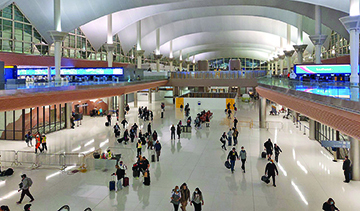by Mark Smiley

Great Hall Renovations: Renovations at Denver International Airport’s Great Hall are expected to reach $2.1 billion in costs.
Renovations at Denver International Airport’s Great Hall are expected to reach $2.1 billion in costs, and the city remains at risk for overpaying for future construction work, according to a follow-up report on a 2023 audit from Denver Auditor Timothy M. O’Brien, CPA.
“It is critical that Denver International Airport manage its construction work costs for a project of this size and scope,” Auditor O’Brien said. “With so much work yet to complete, the airport needs better oversight to prevent spending more than what is necessary.”
Denver International Airport’s Special Projects Division manages and oversees the Great Hall renovations, which are expected to continue into 2028. In the original 2023 audit, they found a lack of supporting documentation in the procurement process for all Great Hall construction projects, including expedited projects. The audit recommended the airport improve this process. Since the audit, two “fast-tracked” projects have occurred. One of them was missing key supporting documents. If documents are inconsistently managed, it may result in noncompliance with city requirements and airport standards.
A separate unimplemented recommendation from the original audit also involved concerns with documentation. Denver International Airport was not requiring contractors to submit documentation of actual costs that could be validated and reconciled with project allowances, which limited the airport’s ability to ensure it was not overpaying for work. Meaningful documentation includes invoices and time sheets. If detailed documentation is not collected, the airport cannot determine whether these costs are reasonable or allowable.
“It is encouraging to see the airport make some improvements to its documentation processes, but more is needed for the public to have confidence that contractors are not overcharging the airport,” said Auditor O’Brien.
Denver International Airport did not agree to implement multiple other recommendations from the 2023 audit, which still present several lingering risks. The airport was not following procurement procedures or documenting and maintaining records for decision-making processes, which may reduce the airport’s ability to show its processes are fair, reasonable, and competitive. Failing to have these policies and procedures to ensure subcontractor work is awarded fairly limits the city’s ability to ensure it receives quality construction work and reasonable costs for subcontractor work. Without proper oversight of multi-tiered subcontracted work, the airport could not ensure contract terms were followed. This could result in overpayments.
The follow-up report found the airport has developed and implemented a process to ensure managers and staff use a risk-based approach to select a construction project’s delivery method. It also developed and implemented policies and procedures addressing the unique risks for the construction manager and general contract project delivery methods.
“Given the importance and public interest in airport renovations, if we see continued risks, we may conduct future audits to ensure the city takes appropriate corrective action,” Auditor O’Brien said.
